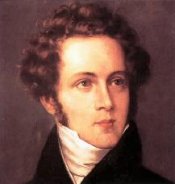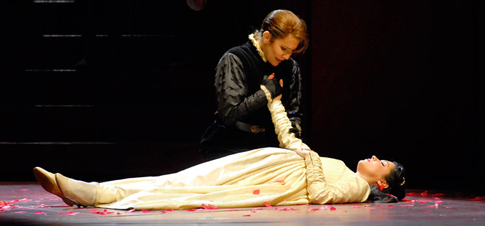
09 Jun 2008
Star Power in Paris “Capuleti”
For Bellini’s “I Capuleti e i Montecchi,” Paris Opera peopled its revival with plenty of star power.
English Touring Opera are delighted to announce a season of lyric monodramas to tour nationally from October to December. The season features music for solo singer and piano by Argento, Britten, Tippett and Shostakovich with a bold and inventive approach to making opera during social distancing.
This tenth of ten Live from London concerts was in fact a recorded live performance from California. It was no less enjoyable for that, and it was also uplifting to learn that this wasn’t in fact the ‘last’ LfL event that we will be able to enjoy, courtesy of VOCES8 and their fellow vocal ensembles (more below …).
Ever since Wigmore Hall announced their superb series of autumn concerts, all streamed live and available free of charge, I’d been looking forward to this song recital by Ian Bostridge and Imogen Cooper.
Although Stile Antico’s programme article for their Live from London recital introduced their selection from the many treasures of the English Renaissance in the context of the theological debates and upheavals of the Tudor and Elizabethan years, their performance was more evocative of private chamber music than of public liturgy.
Evidently, face masks don’t stifle appreciative “Bravo!”s. And, reducing audience numbers doesn’t lower the volume of such acclamations. For, the audience at Wigmore Hall gave soprano Elizabeth Llewellyn and pianist Simon Lepper a greatly deserved warm reception and hearty response following this lunchtime recital of late-Romantic song.
For this week’s Live from London vocal recital we moved from the home of VOCES8, St Anne and St Agnes in the City of London, to Kings Place, where The Sixteen - who have been associate artists at the venue for some time - presented a programme of music and words bound together by the theme of ‘reflection’.
'Such is your divine Disposation that both you excellently understand, and royally entertaine the Exercise of Musicke.’
‘And there was war in heaven: Michael and his angels fought against the dragon; and the dragon fought and his angels, And prevailed not; neither was their place found any more in heaven … that old serpent … Satan, which deceiveth the whole world: he was cast out into the earth, and his angels were cast out with him.’
There was never any doubt that the fifth of the twelve Met Stars Live in Concert broadcasts was going to be a palpably intense and vivid event, as well as a musically stunning and theatrically enervating experience.
‘Love’ was the theme for this Live from London performance by Apollo5. Given the complexity and diversity of that human emotion, and Apollo5’s reputation for versatility and diverse repertoire, ranging from Renaissance choral music to jazz, from contemporary classical works to popular song, it was no surprise that their programme spanned 500 years and several musical styles.
The Academy of St Martin in the Fields have titled their autumn series of eight concerts - which are taking place at 5pm and 7.30pm on two Saturdays each month at their home venue in Trafalgar Square, and being filmed for streaming the following Thursday - ‘re:connect’.
The London Symphony Orchestra opened their Autumn 2020 season with a homage to Oliver Knussen, who died at the age of 66 in July 2018. The programme traced a national musical lineage through the twentieth century, from Britten to Knussen, on to Mark-Anthony Turnage, and entwining the LSO and Rattle too.
With the Live from London digital vocal festival entering the second half of the series, the festival’s host, VOCES8, returned to their home at St Annes and St Agnes in the City of London to present a sequence of ‘Choral Dances’ - vocal music inspired by dance, embracing diverse genres from the Renaissance madrigal to swing jazz.
Just a few unison string wriggles from the opening of Mozart’s overture to Le nozze di Figaro are enough to make any opera-lover perch on the edge of their seat, in excited anticipation of the drama in music to come, so there could be no other curtain-raiser for this Gala Concert at the Royal Opera House, the latest instalment from ‘their House’ to ‘our houses’.
"Before the ending of the day, creator of all things, we pray that, with your accustomed mercy, you may watch over us."
The doors at The Metropolitan Opera will not open to live audiences until 2021 at the earliest, and the likelihood of normal operatic life resuming in cities around the world looks but a distant dream at present. But, while we may not be invited from our homes into the opera house for some time yet, with its free daily screenings of past productions and its pay-per-view Met Stars Live in Concert series, the Met continues to bring opera into our homes.
Music-making at this year’s Grange Festival Opera may have fallen silent in June and July, but the country house and extensive grounds of The Grange provided an ideal setting for a weekend of twelve specially conceived ‘promenade’ performances encompassing music and dance.
There’s a “slide of harmony” and “all the bones leave your body at that moment and you collapse to the floor, it’s so extraordinary.”
“Music for a while, shall all your cares beguile.”
The hum of bees rising from myriad scented blooms; gentle strains of birdsong; the cheerful chatter of picnickers beside a still lake; decorous thwacks of leather on willow; song and music floating through the warm evening air.

For Bellini’s “I Capuleti e i Montecchi,” Paris Opera peopled its revival with plenty of star power.
No question that soprano Anna Netrebko is one of opera’s most visible, most glamorous, and most sought-after marquee names. And the French are positively nutty for mezzo Joyce DiDonato (the rest of the world is catching up) who has scored several (deserved) major career successes in the French capital. Small wonder then that there was a profusion of musical thrill seekers brandishing “je cherche billets” placards outside the sold-out Bastille house.
To get it out of the way up front (as it were): in spite of being five months pregnant, Ms. Netrebko was a radiant and wholly successful “Giulietta.” She was beautifully costumed in a flowing white gown to minimize the modest protrusion of a tummy, and she moved with her usual freedom and grace, including carefully assisted kneeling and fainting moments as required by the plot. Only when she was flat on her “dead” back did her condition become more apparent.
Her full-bodied, creamy lyric voice not only rang out thrillingly in the hall, but she commanded several breathtaking high-flying pianissimi as well. In her current “condition” it seemed that she may have divided up a few of the longer phrases to maintain breath control, but nowhere was this disturbing to the overall line. She nailed all of the familiar set pieces, and the audience responded with predictably enthusiastic ovations.
For all her star quality, natural beauty, musical gifts, and attendant adulation, Ms. Netrebko seems to be a sincere and unaffected colleague, deferring the stage to her co-stars as the focus of the drama requires. A wonderful collaborator, a fine voice, alluring presence, Anna is the real deal without seeming to be a real diva.
To say that she was matched in star power by mezzo Joyce DiDonato’s “Romeo” would be an understatement. Ms. DiDonato has a wide-ranging, high-powered, personalized and slightly reedy voice that she deploys fearlessly to communicate every fine point of this complicated love-torn character. There is no nuance of this role that escapes her. The deeply felt cry when “Giulietta’s” corpse was unveiled broke my heart. She is a fine artist, with perfect diction and total understanding of the text and the internalized emotion behind it. For the record, she was given the final bow, after the more famous Anna (perhaps because the soprano has asked that Patrizia Ciofi spell her for three performances of the run?).
As if these two would not be enough cause for celebration, the entire show was cast from strength. Mathew Polenzani (“Tebaldo”) served notice right at the top that we were in for a sensational night, his refined lyric tenor ringing out in the house, and his first aria/cabaletta as fine as we could wish. “Lorenzo” was so well-voiced by Mikhail Petrenko, and “Capulet” by Giovanni Battista Parodi that it was a pity there was not more for them to do.
 Joyce DiDonato and Anna Netrebko (Photo by Christian Leiber courtesy of Opéra national de Paris
Joyce DiDonato and Anna Netrebko (Photo by Christian Leiber courtesy of Opéra national de Paris
Robert Carsen directed the original production and it is hard to know how much he participated in the revival. An assistant, Isabelle Cardin is also credited. Whoever, this was excellent work. Carsen knows how to place singers on the stage so we are hearing them to maximum advantage, and he knows how to move them logically to those positions through motivated blocking and well-considered character interaction. Good God, a director who knows how to tell the story!
He found an excellent partner in Michael Levine, whose handsome red-paneled walls provided a wonderful playing space with the simple addition of set pieces (stairs, bed, banquet table). The chapel was especially effective with a wide band of light emanating from up left and rows of chairs as pews providing all that was required. The tomb was no less effective, with one wall panel tellingly removed to create a tomb that was ready to accept “Giulietta,” who lay in a pool of light surrounded by flower petals, and was backed by back-lit choristers on a slightly akimbo staircase.
The team immediately established the important background of conflict by having swords stuck in the stage apron which were plucked up by the assembling “Capulets” during the overture. This visual theme was returned to at the end of Act One when the clans square off by advancing on each other and locking weapons in a group freeze center stage at curtain fall. And in a brilliant tweak, at work’s end the two forces assemble in the same aggressive tableau around and over the dead bodies, visually stating that no matter how profound the tragedy, we will walk over the corpses to have history repeat itself.
One other brilliant touch: Act Two opened to the same chapel as had closed One, but revealing dead bodies and over-turned chairs, the sad result of war. As “Giulietta” sank down to her “death,” the dead rose again in a chilling effect, as if on Judgment Day, to welcome her to their ranks. The sumptuous red velvet period costumes (black for the “Montagues”) were exactly right, and provided an elegant sense of time and place.
Conductor Evelino Pidò’s reading of this score was a revelation. I cannot ever remember being so persuaded by the music, or so engaged in, and moved by the drama of Bellini’s somewhat flawed version of the famous tale. The solo work from the clarinet, cello, harp, and horn was top drawer, and indeed the entire orchestra performed splendidly.
There are those who may have come to “I Capuleti e i Montecchi” because it was “the event” of the season, but they most certainly stayed to cheer it to the rafters because it was just so damn’ good. Make that “great.”
James Sohre